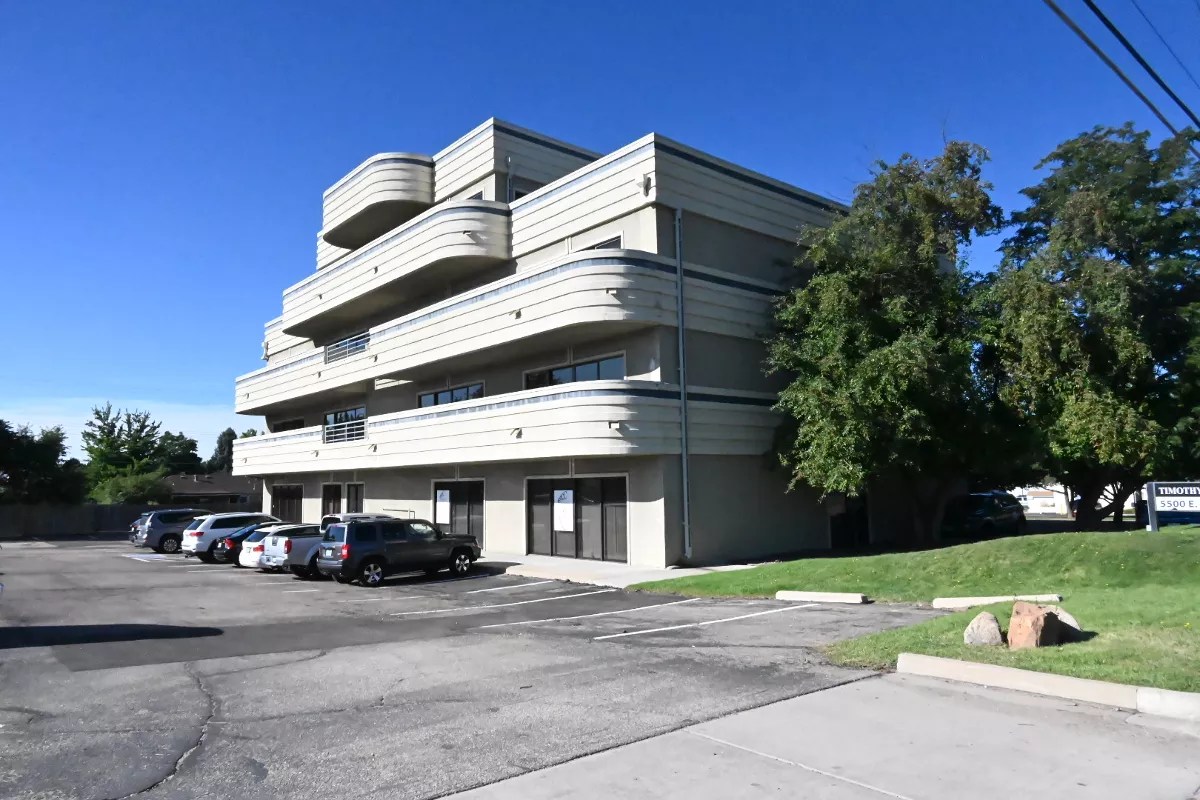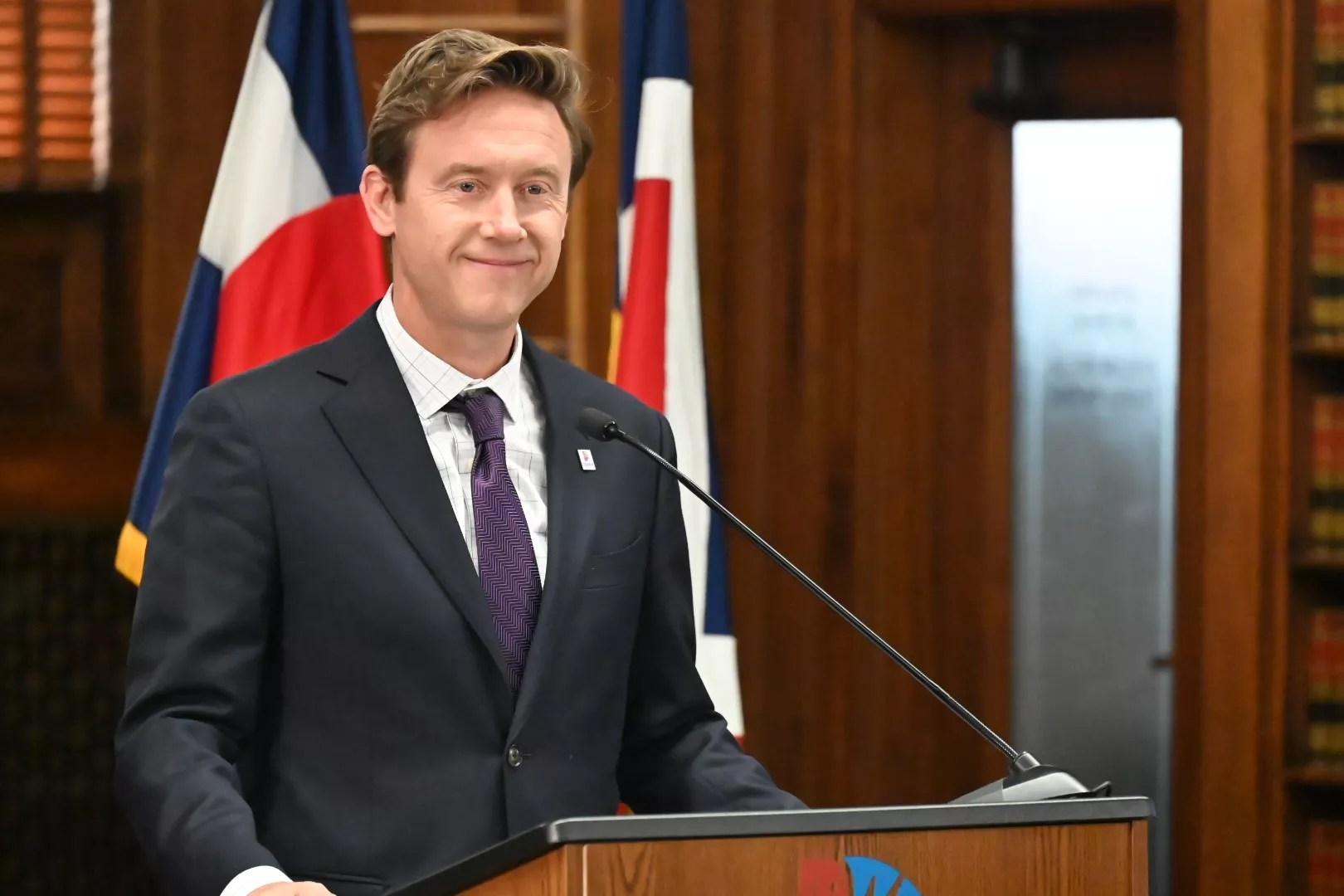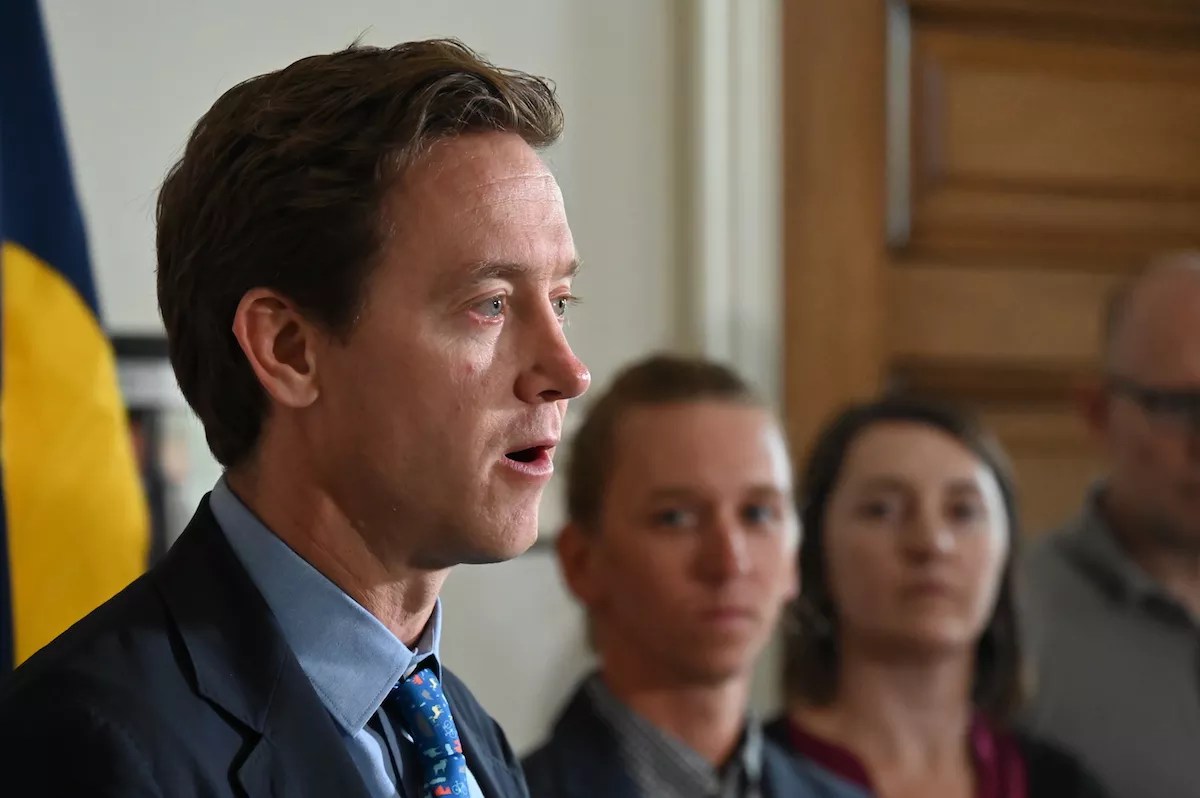
Bennito L. Kelty

Audio By Carbonatix
Fed up with feeling ignored, residents in Denver’s Holly Hills area who have publicly opposed Mayor Mike Johnston’s homeless housing plan – which is putting a micro-community in their own backyard – see no other option but to form a Registered Neighborhood Organization to fight back.
Roughly 300 people live in a pocket of the Denver city limits next to Holly Hills, a renowned suburban enclave that’s part of unincorporated Arapahoe County. The pocket is situated between Interstate 25, the High Line Canal and Yale Avenue.
Their interest in forming an RNO stems from the mayor’s recently announced micro-communities plan, which is aimed at housing 1,000 unhoused people by the start of 2024, as Johnston has publicly vowed.
On August 25, the city revealed the location of eleven proposed sites for micro-communities – made up of tiny homes and pallet shelters – that will ultimately play a key role in Johnston’s housing initiative.
Alec Baker, a spokesperson for the neighborhood, which calls itself the “Holly Hills Pocket,” tells Westword how the area’s desire for an RNO grew from mounting frustrations and fears that residents have about a planned micro-community site at 5500 East Yale Avenue that is expected to host between 100 and 400 people.
The Holly Hills neighbors are “certainly going to be starting our own registered neighborhood organization,” Baker says, because they see it as the best way “to advocate for us and protect us,” he adds.
“They’re not putting them in places with registered neighborhood organizations,” Baker blasts in reference to the micro-communities. “They acknowledge the importance of registered neighborhood organizations in order for the neighborhoods to navigate this with micro-communities.”
The residents in the Holly Hills Pocket are currently represented by the University Hills Neighborhood Association, though it technically sits in the Hampden neighborhood, according to the City of Denver.
The city has 183 RNOs for 78 neighborhoods that it recognizes.
According to Baker, the residents of the Holly Hills Pocket say they weren’t involved in discussions that Mayor Johnston had with the University Hills Neighborhood Association, and they were surprised to see 5500 East Yale listed as a potential micro-community site. “We found out about this in late August from a news report,” Baker claims.
He believes that he and his neighbors weren’t informed because “we are not a registered neighborhood organization.”
Baker notes how Johnston “discussed the importance of registered neighborhood organizations for neighborhoods being able to advocate for themselves and mediate relationships with any micro-communities that go there” during a town hall with the city’s RNOs on September 12.
Neighborhood organizations like RNOs are also needed to create legally binding Good Neighbor Agreements, also known as Community Benefit Agreements, Baker adds, which can establish a set of rules between neighborhoods and nearby entities such as businesses, property owners and developers.

Denver Mayor Mike Johnston says the city will spend at least 2 million to get people off the streets and into housing.
Bennito L. Kelty
Holly Hills Pocket residents weren’t the only ones caught off guard by Johnston’s micro-community plans: People living in Denver’s Golden Triangle Creative District spoke to Westword earlier this month about their surprise when they realized that their comparably tiny area was expected to host two sites.
Residents of both the Golden Triangle and the Holly Hills Pocket complain that they feel like the mayor is leaving them in the dark by not telling them more about why their neighborhoods were chosen without asking how they feel.
“We’ve had an opportunity to air our thoughts, but we’ve had virtually no qualitative response,” Baker says. “We bring up things like, ‘This doesn’t meet your criteria.’ The mayor says, ‘This is compelling,’ then we don’t hear anything else.”
When Johnston answered a question about concerns by neighbors related to his micro-community plan during a September 12 press conference, he said that the data ultimately backs up his initiative, as micro-communities generate fewer calls to police, according to city officials.
“You’re talking about sites that are literally one one-thousandth of the safety risk to the community of what the current situation is,” Johnston said. “The most dangerous thing to communities would be for us to do what we’ve done in the past. That’s actually the single most dangerous strategy – is keep folks living in encampments that are unsupervised, unstructured, unsafe.”
Baker’s response after hearing that: “When you look at data, you’re looking at averages,” he says. But not every site will have the average amount of crime found in and around micro-communities.
“There are sites that could be better, there could be sites that are worse,” Baker explains. “It’s unlikely that you’re going to find sites that are average. We’re pointing out that there are flaws in this site that predispose it to crime.”
A similar complaint has been made by residents who live near High Street and Colfax Avenue, who say that the mayor seemed to ignore their complaints about crime at an encampment outside their homes. The encampment was later removed through what Denver Police called a “soft-enforcement operation.”
The Holly Hills Pocket residents are tired of feeling like they’re being “strung along” by the mayor’s plan, Baker says, and they’ve decided that becoming an RNO is the best action and will help get their points across.
Three main issues stand out, though: the high amount of traffic in the area, its placement right on a boundary with unincorporated Arapahoe County, and its proximity to two schools.
Residents have found that the proposed site will be within 1,000 feet from both the Montessori School of Wild Pines and the Calvary Church of Denver, which hosts the K-12 Calvary Apostolic Academy. The site is near Holly Hills Elementary, as well, but it’s more than 1,000 feet away.
The proposed micro-community’s position near unincorporated Arapahoe County worries people in the area, with many fearing it will allow criminals to get away with bad behavior by jumping one jurisdiction over, Baker says.
“Implicit in the mayor’s plan is that all these micro-communities will come with some level of social risk,” he tells Westword. “That’s why they don’t want them to be within 1,000 feet of schools. In our area, there’s CDOT, there’s Denver and there’s Arapahoe County. When something goes wrong, if we call 911, 911 doesn’t always know who to send.”

Last month, Mayor Mike Johnston said micro-communities will play a big part in his plan to shelter 1,000 people by 2024.
Bennito L. Kelty
As a result, Baker says neighbors worry that “response time is going to be delayed,” and “if somebody is at the micro-community in Denver County and heads into Arapahoe County, whose problem is it?”
Residents are also pointing to a traffic study published in 2020 by the Denver Department of Transportation and Infrastructure that looks at the safety risk on Yale Avenue from Downing Street to the High Line Canal. The 21-page report found “narrow sidewalks,” “unsafe” bike lanes, wide car lanes that could give way to “excessive speeds,” and a high rate of accidents at the intersection of I-25 and Yale Avenue – where the micro-community is planned.
“The site itself, by the city’s own reckoning according to the Yale Corridor Report, is much more dangerous than the average location in the city,” Baker says. “You’re talking about adding a large number of people who have to use pedestrian and bike paths, who have no options but to use a substantially dangerous piece of road.”
A three-story building currently sits at 5500 East Yale, along with multiple businesses with offices and storefronts. That spot is also at the mouth of one of just two streets – Hudson and Holly streets – that provide access in and out of the Holly Hills Pocket.
The city confirmed on Thursday, September 21, that demolishing the building at the address “would most likely be necessary” should Johnston stick with it as a micro-community site. But it “is continuing to evaluate all of the eleven proposed sites,” according to officials.
The Holly Hills site is owned by 5500 E Yale LLC, per Denver records, which say the business is registered to Jerrold Glick, who could not be reached for comment.
Glick is the managing partner of the Denver-based investment company the Columbia Group. He also donated $10,000 to Advancing Denver – a super PAC that supported Johnston’s mayoral bid – on February 10. Glick gave the same amount to A Better Denver, which supported Chris Hansen’s bid for mayor, according to Denver records. His son, Fred Glick, is also on the Denver Planning Board, which is responsible for advising the mayor and Denver City Council on land use.
The Yale Avenue property was owned from 1988 to 1994 by a company called 5500 E. Yale Inc that dissolved in 1999. That company sold the property for $885,000 to the Strom Corporation – an engineering consultancy – before it was purchased by Glick’s 5500 E Yale LLC for $4 million in June 2022.
Along with the Holly Hills location, three known micro-community sites are planned to open on privately owned land; the owners of all three properties are connected to donors to Johnston’s mayoral campaign, though most gave $500 – a relatively small amount – and several donated to other mayoral candidates.
The Holly Hills Pocket residents won’t be able to apply to become an RNO until December, around the time that Johnston plans to start moving people off the streets and into micro-communities and other housing options. Baker says the suburb is also considering challenging the mayor in court, if all else fails.
“People can’t functionally get an RNO in place that would be able to advocate for them before many of the sites are going to be finalized,” Baker concludes. “At the same time, we thoroughly believe this will have an unbalanced impact on our neighborhood, and we will go to the mat to fight it.”